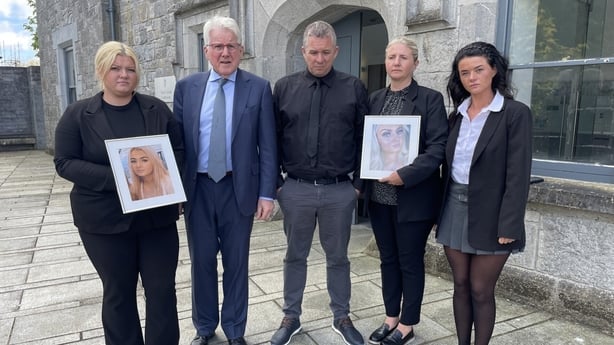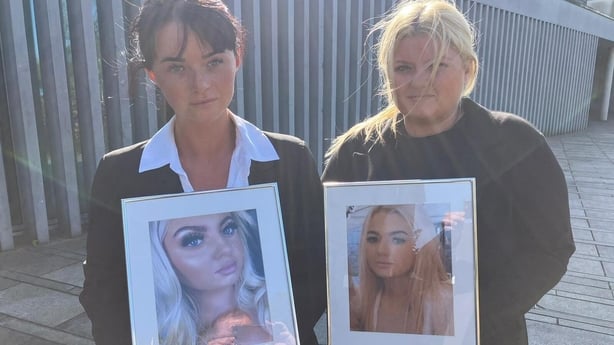A doctor who was working in the emergency department at University Hospital Limerick on the evening Aoife Johnston presented has said staff were in "an impossible situation" as a result of chronic overcrowding at the facility.
Dr Leandri Card was the only senior house officer on duty on the night of 17 December 2022.
She has started giving evidence to the inquest into the death of the 16-year-old, who died after being sent to the emergency department with suspected sepsis on that weekend.
Proceedings resumed at Kilmallock Courthouse earlier today.
In her deposition to the inquest, Dr Card said the department was extremely busy on the night, with Category 2 patients waiting 19 hours to be seen, while those listed as Category 3 patients faced a 39-hour wait.
She said nursing staff were overwhelmed by the volume of people seeking treatment with almost 200 people waiting in the emergency department.

Dr Card said many of the Category 2 patients were very sick with a cold spell exacerbating the usual pressures.
She detailed how a nurse had asked her to review Aoife Johnston at 6am on 18 December, as she had not been seen by a doctor at that stage, some 13 hours after her arrival at the hospital.
Ms Johnston was conversing with her but seemed anxious when the examination began, Dr Card said.
She had generalised body pain and was flushed in appearance but had no rash. Her white blood cell count was normal at the time.
Dr Card said she suspected the patient may have had a viral illness but explained that conditions like meningitis can be hard to diagnose in an emergency department setting and she requested further tests.
As a precautionary measure, she prescribed antibiotics and carried out a viral swab to augment blood tests.
She considered moving Ms Johnston to the resuscitation area but said this was not an option due to the level of overcrowding there.
Dr Card said that at the time of her examination, the clinical picture was not that of a patient who would deteriorate as rapidly as Ms Johnston did.
Under cross-examination by Counsel for the Johnston family Damien Tansey, Dr Card explained how patients in the emergency department are routinely prescribed medication without being seen by a doctor.
While this is far from ideal, she said it happens on "every shift, every day".
We need your consent to load this rte-player contentWe use rte-player to manage extra content that can set cookies on your device and collect data about your activity. Please review their details and accept them to load the content.Manage Preferences
She agreed with Mr Tansey that this was not best practice and might result in adverse outcomes, as the full clinical picture was not taken into account in such circumstances.
However, she said that "due to the state of the department" being "like a war zone…you do what you have to, to survive".
Dr Card got upset a number of times while recalling her experiences on the night in question.
She agreed with Mr Tansey that the wait times in the emergency department are intolerable.
She said the Aoife Johnston case had an impact on her and her decision to cease working for the Health Service Executive was directly linked to the events of that weekend.
'Busy but manageable'
The Assistant Director of Nursing in UHL at the time of Aoife Johnston's death has also been giving evidence to the inquest.
Nicola Quinn said the ED was very, very busy, but rejected the suggestion that it was like a war-zone, saying she would not use such terminology.
"It was a very busy department… yes, I would agree that it was really, really busy but it wasn’t a business that we were not used to."
She said that when she started her shift on 17 December, no concerns had been flagged to her, describing the situation as "busy but manageable".
But as the day progressed, more people were presenting at the ED, many as a result of injuries sustained from falls on icy ground.
This led Ms Quinn to seek agency staff and off-duty staff to address shortages. "I exhausted all options for any available staff," she told the Court.
Under cross examination, she said she had never heard of doctors prescribing medication without reviewing patients in the ten years she worked in the ED.
"As a rule, it doesn’t [happen]", according to Ms Quinn.
'Did not get any handover notes'
Dr Manoj Kumar Budhauliya gave his evidence via video link from India.
He was a Medical Registrar on call at the emergency department on 18 December 2022.
Dr Kumar was contacted by the SHO to see Aoife Johnston at around 8.45am.
He told the inquest he did not get any handover notes from overnight staff before seeing Aoife Johnston at around 9am on Saturday 18 December, but that he briefly reviewed her chart in advance.
Dr Kumar said Ms Johnston was very agitated, unwell and not able to answer questions about her condition.
He agreed with Mr Tansey that by the time he saw Ms Johnston she was critically ill and beyond the point of recovery.
"It's not best practice'
Dr Muhammad Bilal, an emergency medical physician, was on duty until 10pm on 17 December.
He told the inquest how many of those attending the emergency department that night had sustained injuries after falling on ice, placing additional pressure on the facility.

He said the situation was chaotic, with an unusually high incidence of people seeking treatment for broken bones.
Dr Bilal said he had limited involvement in the treatment of Aoife Johnston and had no recollection of being asked to see her by colleagues.
He confirmed that he signed an ECG which had been carried out on the patient and that he signed prescriptions for medications administered before his shift ended.
Dr Bilal conceded that "it's not best practice" to prescribe without seeing a patient, but he explained that in the emergency department "there’s always a time lapse before a patient can be seen" and in such instances paracetamol or nausea medications can help ease some symptoms.
He told Mr Tansey he was unaware Aoife Johnston had been referred to the emergency department with suspected sepsis.
Dr Bilal also said he had no recollection of being asked to admit her to the resuscitation area.
'Three critical opportunities' were lost
Consultant Dr Pardeep Maheshwari was on call at the hospital on 17 and 18 December, providing clinical governance.
His first interaction with Aoife Johnston was also around 9am on the morning of 18 December.
Referring to evidence heard yesterday, Mr Tansey said it was the Johnston family’s view that on three occasions nursing staff made efforts to have their daughter seen by a doctor.
He said "three critical opportunities" were lost, in which to address the medical issues she was experiencing.
Much of his cross-examination centred on the length of time it took to administer antibiotics to Ms Johnston.
Dr Bilal agreed that by the time he saw her, she was critically unwell and that the situation had been compounded by delays with medication being administered.
Dr Lauren Fernandes, a senior health officer at the hospital since July 2022 told the inquest how she felt helpless in her interactions with the Johnston family, as their daughter’s condition worsened.
She arrived for the start of her shift on the morning of 18 December at 8am.
Soon afterwards, Aoife Johnston was moved to the resuscitation area in the emergency department.
She had an "altered mental state" and was extremely agitated at this time, according to Dr Fernandes.
She consulted with her parents to determine the background of her presentation.
She said it was difficult to conduct a full neurological examination and told Mr and Mrs Johnston that an urgent CT scan of her brain was needed, as she feared the onset of bacterial meningitis or encephalitis.
Given the possibility of acute deterioration, she said a timely intervention in such cases was important.
'There were patients that required a doctor'
Allison Nolan was also on duty in the hospital that weekend, working as a Clinical Nurse Manager.
She agreed the situation in the ED was chaotic and made it hard to function. When asked by Mr Tansey if the tragedy was a function of that chaos, she relied that "it certainly didn't help".
She also agreed that there had been a breakdown in communication when it came to following up the initial GP referral for Aoife Johnston, which flagged suspected sepsis. This lapse extended to handover notes between shifts, when there was no specific mention of the condition of the 16-year-old.
There were 164 people in the ED when she started her shift on the evening of 17 December. Ms Nolan said at that stage, Category 2 patients faced a "considerable" wait. International best practice suggests patients deemed to be in this category should be seen in ten to fifteen minutes.
At that point a colleague, Katherine Skelly, telephoned two consultants to alert them to the conditions in the ED.
Ms Nolan said this arose out of concerns on the night relating to the volume of patients, which might be eased by additional clinical cover.
She added that another expectation was that there would be direction given to junior doctors working under pressure in the Department.
Initially both consultants declined to come in to the hospital but a paediatric consultant subsequently attended the ED.
Ms Nolan said symptomatic relief medications such as paracetamol or IV fluids would sometimes be prescribed by doctors without seeing a patient but this practice would not be common when it came to antibiotics.
At the conclusion of her cross-examination Ms Nolan was asked about a report made about the failure on the part of one of the consultants to report for duty when requested to.
Ms Nolan said she hoped that the matter would be escalated by her superiors: "There were patients that required a doctor. Aoife needed a doctor. Absolutely I was unhappy."
The inquest is continuing.







